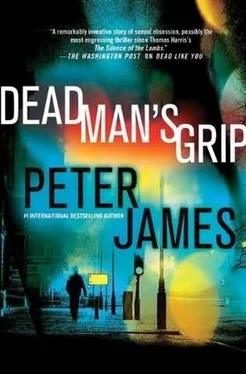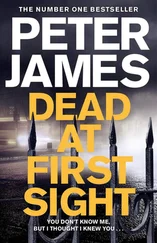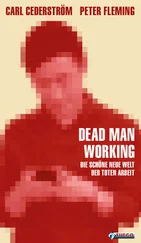With a bit of luck, they’d pot him within a few days – and find out why he did a runner. Probably, Grace speculated, because he should have been working on a construction site near the prison at nine on Wednesday morning and not driving a van in Brighton, twenty-five miles away. Almost certainly with something illegal inside it.
If they could get an explanation out of Preece, he should be able to wrap up the inquiry by the end of next week. And hopefully win some brownie points with Peter Rigg. It all looked pretty straightforward.
Fortunately for Roy Grace’s mood at this moment, he didn’t know how brutally different things were going to turn out to be.
There was a long jam on the approach to the roundabout opposite the Palace Pier – wrongly, in Roy Grace’s traditionalist view, renamed Brighton Pier . As he sat, slowly crawling forward in the traffic, he watched a couple pushing their stroller along the promenade. He found himself looking at them with intense curiosity. That was something, he realized, that had definitely changed inside him. He’d never, ever, been remotely interested in babies. Yet in recent weeks, wherever in the city he had been, he had suddenly found himself staring at babies in buggies.
A few days ago, buying a sandwich in the ASDA superstore opposite his office, he began making inane comments to the mother and father of a tiny infant in a stroller, as if the three of them were members of a very exclusive club.
Now, as the engine idled, and an old Kinks song played on BBC Radio Sussex, he found himself looking around for more buggies. A few evenings ago, the night before Cleo had gone into hospital, they’d spent a long time studying them on the Internet and had made a shortlist of ones they thought might be suitable.
Cleo was keen on ones he could go jogging with. She thought it would help him to bond with the baby, as his work would preclude them from spending much time together otherwise. One pregnancy book they had been reading together warned of this, that while the mother would be at home, developing her relationship with the baby, the father would be at work, becoming increasingly remote.
Across the road he could see a man about his own age jogging along with a baby in a Mountain Buggy Swift. Then he saw a female jogger with one they favoured, an iCandy Apple Jogger. Moments later he saw another they liked, because of the name, a Graco Cleo. And over on the far side of the promenade he saw a single woman pushing the one that they liked most of all – which was unfortunately one of the most expensive – a Bugaboo Gecko.
Money was no object, luckily. Cleo had told him that her parents wanted to buy it for them. Ordinarily Grace would have insisted on paying for everything himself. That was the way he had been brought up. But he had done the sums and the cost of having a baby was terrifying. And seemingly endless. Starting with having to turn the spare room at Cleo’s house into the baby’s room. They had been advised that it should be painted well in advance, so there was no danger to their baby from paint fumes. Then there were the digital baby monitors Cleo wanted, so they could hear the baby’s breathing. The Moses basket for the baby to sleep in during its first few months. Decorations for the room. Clothes – which they could not buy yet as they did not know whether it was a boy or a girl.
It was strange not being able to put a sex to the baby. Just an it . Neither he nor Cleo wanted to know. But Cleo had told him on several occasions she believed it would be a boy, because the bump was high up, and because, another old wives’ tale, she had been craving savoury rather than sweet things.
He did not mind. All he cared was that the baby was healthy and, more importantly to him, that Cleo was fine. He had read that fathers sometimes, when things went badly wrong, had to make a decision between saving the life of the baby and of the mother. In his mind there was absolutely no question at all. He would save Cleo every time.
A Ziko Herbie stroller went by on the promenade. Followed by a Phil & Teds Dash, a Mountain Buggy and a Mothercare Mychoice. It was sad, he thought, that he had acquired this encyclopedic knowledge of buggies in such a short space of time. Then his phone rang.
It was Norman Potting. ‘Boss,’ he said. ‘I’ve got good news and – ah – not good news. But I’m running out of battery on my BlackBerry.’
‘Tell me?’
All he got in reply was silence.
Someone had left the Münchner Merkur further along on the wooden trestle table where she sat, alone, beside the Seehaus lake in the Englischer Garten. The Merkur was one of Munich’s two local papers. On the front page was a photograph of a large silver coach that had rolled on to its side, straddling and buckling an autobahn crash barrier. Emergency service crews in orange suits were standing around it and there was a bleeding victim partially visible on a stretcher.
The headline, which she translated into English in her head as she read, said, SEVEN DIE IN AUTOBAHN COACH CRASH.
Although now fluent in German, she still thought in English and, she realized some mornings, still dreamed in English. She wondered if one day that would change. She had German blood. Her grandmother on her mother’s side had come from a small town near here and she felt increasingly strongly, with every day that passed, that Bavaria was her true spiritual home. She loved this city.
And this park was her favourite place in it. She came here every Saturday morning that she could. Today the April sunshine was unseasonably hot and she was grateful for the breeze blowing off the lake. Although dressed lightly in a T-shirt, Lycra jogging shorts and trainers, she was perspiring heavily after a ten-kilometre run. Gratefully, she gulped down half the bottle of the cold mineral water she had just bought in one draught.
Then she sat still, breathing in the sweet scents of grass and lake water and wood varnish and pure clean air. Suddenly she caught a waft of cigarette smoke from someone nearby. Instantly, as it did almost every time, that smell brought a twinge of sadness – memories of the man she had once loved so much.
She took another swig of the bottle and reached over to pick up the paper, as no one seemed to be coming back to claim it. Only eleven o’clock and the Englischer Garten was busy already. Dozens of people sat at the beer garden tables, some obviously tourists but many of them locals, enjoying the start to the weekend. Most had a Maß of beer in front of them, but some like herself were drinking water or Cokes. Several people were out on the lake in rowing boats and pedalos, and she watched for a moment as a mother duck, following by a string of tiny brown ducklings, rounded the wooded island.
Then suddenly a very determined-looking Nordic walker in her sixties, wearing bright red Lycra, teeth clenched, ski poles clacking on the ground, was heading straight towards her.
Leave me alone, don’t invade my space, she thought, planting her elbows on the table and giving the woman a defiant glare.
It worked. The woman clacked off and settled at a table some distance away.
There were times, such as now, when she craved solitude, and there were precious few moments when she was able to find it. That was one of the things she most treasured about her Saturday morning runs. There was always so much to think about and not enough time to focus on it. Her new masters gave her new thoughts to work on every week. This week they had told her, Before you can seek new horizons, first you have to have the courage to lose sight of the shore .
Surely she had done that ten years ago?
Читать дальше












